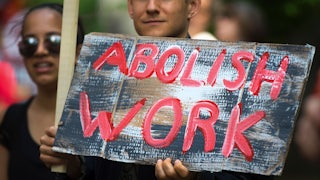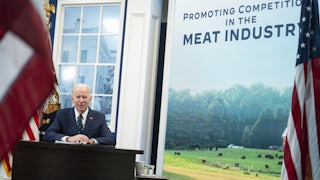On January 20, 2021, after President Joe Biden was sworn in on the West Front of the Capitol, and about the time Amanda Gorman finished reciting her inaugural poem, Peter Robb received an email from the new president telling him to clear out his desk by 5 p.m. This was unusual. Robb was general counsel of the National Labor Relations Board, and while incoming presidents frequently dismiss their predecessors’ appointees, they don’t typically muck around with independent agencies like the NLRB. Robb, a Trump appointee, still had about 10 months left in his term. But a statutory quirk allowed Biden to fire Robb, even though no one could remember such a thing happening before.
Presidents seldom come into office knowing what it is an NLRB general counsel does, much less who holds the job. The anodyne title belies the job’s importance. Biden, the most pro-labor president since Harry Truman, understood that whoever was NLRB general counsel would exercise tremendous power—more power, arguably, than anybody else in government—to carry out his administration’s labor policies. Clearly Robb, a management partisan who helped Ronald Reagan break the air traffic controllers’ union, had to go. Less than one month after Biden pushed Robb out, he nominated Jennifer Abruzzo to replace him. She arrived at the agency in July after a party-line Senate confirmation.
The NLRB is a quasi-judicial panel that hears cases, makes rulings, and sets binding precedents about what does and doesn’t constitute a violation of labor law (committed usually, of course, by management). The NLRB’s general counsel is effectively the agency’s prosecutor. The general counsel also supervises the agency’s 26 regional offices, where claims of unfair labor practices are investigated and, in most instances, resolved. That gives Abruzzo enormous influence over what the federal government’s rules will be about how managers in the private sector may or may not treat their workers.*
Under Trump, NLRB enforcement withered. Robb settled, for a pitiful $172,000, an ambitious case brought by his Democratic predecessor that documented widespread labor violations at McDonald’s franchises in which the corporation was plainly complicit. Robb tried (unsuccessfully) to demote the regional directors en masse. Morale cratered, with surveys recording rapidly growing employee dissatisfaction. During Robb’s first two years, the NLRB staff shrank by 13 percent. This all reflected the administration’s wider anti-union agenda. Trump decried on Twitter “Dues Crazy” unions that “rip-off their membership.” He harassed federal employee unions through executive orders and weakened worker safety protections.
Biden and Abruzzo are trying to reverse as much of this as they can. Abruzzo, a Queens native from a large Roman Catholic family, worked at the agency for almost 23 years, starting as a field attorney in Miami and ending up as the deputy general counsel during the Obama administration. When I first met her five years ago at a dinner, she displayed a lively wit, but when we met again for an interview last fall at the NLRB’s offices in D.C.’s Capitol Riverfront neighborhood, she was poker-faced and all business, in the preferred style of official Washington. In an email, she later described herself as a “voracious reader and an enthusiastic elliptical rider” who typically does both simultaneously.
During Robb’s reign of terror, she joined the staff exodus. “Elections have consequences,” she told me, “and that was one of them.” Abruzzo, who’d spent the interim working as special counsel at the Communications Workers of America, pronounced herself delighted to return. “It’s my family, right?” she said. Immediately, she set about bringing the agency back to life.
In September, Abruzzo laid down a marker on the controversial question of whether college sports players are employees. In a memo, she argued they were, citing the Supreme Court’s 2020 decision in NCAA v. Alston, which expanded colleges’ ability to compensate athletes. “If by word or by deed they are led to believe they really have no rights,” Abruzzo told me, “then that’s a violation in and of itself of our statute.”
What Abruzzo called “our statute” is the Wagner Act, the 1935 law, formally known as the National Labor Relations Act, that created the NLRB and remains the principal law governing management-labor relations. Abruzzo was citing the rights all private-sector employees enjoy under the Wagner Act to form a union or engage in other “concerted” (i.e., collective) activity to improve working conditions.
Abruzzo’s memo was basically an invitation to college players and other interested parties to sue. In November, Michael Hsu of the College Basketball Players Association took her up on it. Hsu filed a complaint in the NLRB’s Indianapolis office alleging that the NCAA interfered with the exercise of college players’ right to self-organization. Whatever the administrative law judge in that region decides will surely be appealed, leaving the board to issue a final ruling, a process likely to take a year or two from start to finish.*
“They’re statutory employees,” Abruzzo told me. That these players receive no wages, Abruzzo said, is irrelevant under the Wagner Act. From her view, all that matters is that these workers “perform services for their university or college, and that university or college controls, or has the right to control, much of their daily lives.”
Abruzzo is also recommitting the NLRB to protecting the right of immigrants to organize regardless of their immigration status—a low priority under the Trump administration. In a November memo, she ordered NLRB officials not to collect Social Security or taxpayer identification numbers from witnesses giving affidavit testimony against an employer; that these witnesses be assured no inquiry will be made into their immigration status; and that when witnesses don’t wish to enter a federal building, affidavits should be taken in a “neutral” setting.
A little-discussed provision in the Build Back Better bill would greatly expand the NLRB’s ability to penalize employers. Since its establishment, the NLRB has lacked authority to level any monetary fine beyond requiring employers to furnish back pay to dismissed workers. Consequently, employers don’t lose a lot of sleep over violating labor law (as opposed to, say, violating anti-discrimination laws, under which workers can collect substantial damages). The BBB bill would change that by allowing the NLRB to impose fines of up to $50,000 per violation, and up to $100,000 per violation if the business is a repeat offender. These fines would usually be imposed on businesses, but in egregious cases they could be imposed on individual managers as well. “Employers would certainly think twice,” Abruzzo told me, if such fines became possible.
Abruzzo noted in a September memo that the Biden board had already suggested back pay could include health care expenses; fees on credit card debt that the fired employee could no longer pay; and the cost of losing a car or home. If an undocumented worker won a case against their former employer, Abruzzo wrote, that person could demand additional compensation if wages were depressed by the person’s immigration status. In cases where the NLRB throws out the results of a union election because the employer engaged in unfair (that is, illegal) labor practices—as, for example, the agency did regarding last spring’s vote to organize an Amazon warehouse in Bessemer, Alabama—Abruzzo said the board might want to require the employer to pick up the cost to the union of running a second election campaign. Take that, Jeff Bezos!
A Trump-era drop in caseload is partly attributable to declining union membership, but another factor, Abruzzo noted, is that during GOP administrations, workers and unions are less eager to file charges lest they risk creating anti-labor precedent. Stare decisis doesn’t cut much ice at the NLRB; precedents swing madly back and forth, depending on whether a Democrat or a Republican is in the White House.
One of the more ludicrous examples concerns whether graduate students at private universities who are paid to teach or assist research may join unions. Under President Richard Nixon, the board said yes in 1970. Then it said no, they may not, in 1972 (Nixon again). An even firmer no again in 1974 (Gerald Ford). Then, in 2000, the board said sometimes yes, sometimes no (Bill Clinton, of course). No once more in 2004 (George W. Bush). Then yes, in 2016 (Barack Obama).
The Trump board tried to kill grad student unions by issuing a regulation, but rulemakings take time, and the regulation wasn’t completed before Trump left office. So Biden scuttled it. Graduate students at Columbia, Brown, NYU, Stanford, and every other private university in the United States remain free to affiliate with unions. For now, anyway.
Perhaps, Abruzzo said, the Biden board will attempt regulations of its own to resolve such disputes on a more permanent basis, but “that takes a lot of time, and it’s resource-intensive.” It’s also outside the general counsel’s purview. For her part, Abruzzo said the Wagner Act “should be broadly construed to cover as many workers as possible.” The Wagner Act is not neutral on the question of whether the NLRB should work to increase union representation. “I think that gets lost,” Abruzzo told me. If workers “can actually engage with their employer with or without a union and actually feel like they can improve their lot in life, it’s only going to help all of us.”
* This article originally misstated who decides which cases to bring on appeal to the NLRB.
The article also has been updated.






